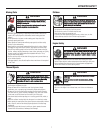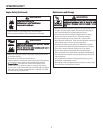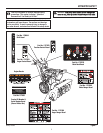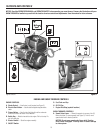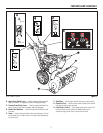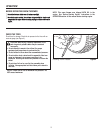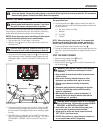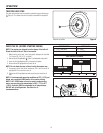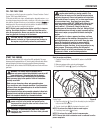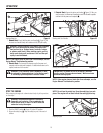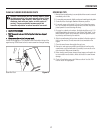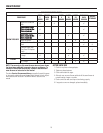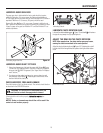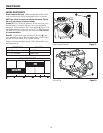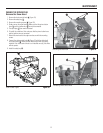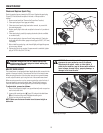
15
Start the engine as follows:
1. Check the oil level. See the “Check/Add Oil” section in the ENGINE
MANUAL.
2. Make sure equipment drive controls are disengaged.
3. Push the ON /OFF switch (A
A
, Figure 8) to the ON position.
Starting Engine Figure 8
4. Insert the safety key (A
A
, Figure 9) into the safety key slot and push
fully in to the RUN position.
5. Turn the choke knob (B
B
) fully clockwise if engine is cold.
NOTE: Do not use the choke to start a warm engine.
6. Push the primer button (C
C)
two times.
NOTE: Do not use the primer to start a warm engine.
NOTE: Ensure that electric extension cord is removed from the
power receptacle.
FILL THE FUEL TANK
This engine is certified to operate on gasoline. Exhaust Emission Control
System: EM (Engine Modifications).
Fill the fuel tank with fresh, clean, unleaded regular, unleaded premium, or re-
formulated automotive gasoline with a minimum of 85 octane along with a
fuel stabilizer (follow instructions on fuel stabilizer package). D
DO NOT
use
leaded gasoline. We recommend that fuel stabilizer be added to the fuel
each time that gasoline is added to the fuel tank.
NOTE: Winter grade gasoline has higher volatility to improve
starting. Be certain container is clean and free from rust or
other foreign particles. Never use gasoline that may be stale
from long periods of storage in the container.
CAUTION: DO NOT use gasoline containing any
amount of alcohol as it can cause serious damage to
the engine or significantly reduce the performance.
START THE ENGINE
Be sure that engine oil is at FULL mark on the oil fill cap/dipstick. The snow
thrower engine is equipped with an A.C. electric starter and recoil starter. Before
starting the engine, be certain that you have read the following information.
If engine floods, set the choke to the OPEN/RUN position and crank until the en-
gine starts.
WARNING: The electric starter is equipped with a
three−wire power cord and plug designed to operate on AC
house hold current. The power cord must be properly
grounded at all times to avoid the possibility of electric shock
which can cause injury to the operator. Follow all instructions
carefully as set forth:
Make sure your house has a three−wire grounded system.
If you are not sure, ask a licensed electrician. If your house does
not have a three−wire grounded system, do not use this electric
starter under any condition.
If your house has a three−wire grounded system but a three-hole
receptacle is not available to connect the electric starter, have a
three−hole receptacle installed by a licensed electrician.
WARNING: To connect power cord, always connect the
power cord first to the switch box located on the
engine and then plug the other end into a three−hole
grounded receptacle.
WARNING: To disconnect the power cord, always
unplug the end connected to the three−hole grounded
receptacle first.
WARNING: Gasoline is flammable. Always use
caution when handling or storing gasoline. Turn
engine off and let engine cool at least two minutes before
removing the gas cap. Do not add gasoline to the fuel tank
while snow thrower is running, hot, or when snow thrower
is in an enclosed area. Keep away from open flame,
electrical sparks and DO NOT SMOKE while filling the fuel
tank. Never fill the fuel tank completely; but fill the fuel
tank to within 1-1/2 inches (3.8 mm) from the top to
provide space for the expansion of the fuel. Always fill fuel
tank outdoors and use a funnel or spout to prevent spilling.
Make sure to wipe up any spilled fuel before starting the
engine.
Store gasoline in a clean, approved container, and keep
the cap in place on the container. Keep gasoline in a cool
well ventilated place; never in the house. Never buy more
than a 30 day supply of gasoline to assure volatility.
Gasoline is intended to be used as a fuel for internal
combustion engines; therefore, do not use gasoline for any
other purpose. Since many children like the smell of
gasoline, keep it out of their reach because the fumes are
dangerous to inhale, as well as being explosive.
A
OPERATION



